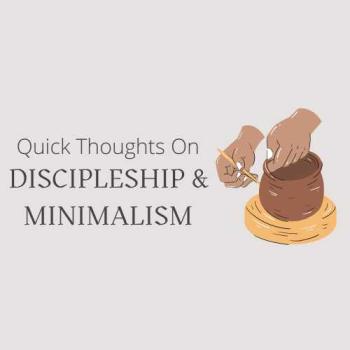
“No one can serve two masters. Either you will hate the one and love the other, or you will be devoted to the one and despise the other. You cannot serve both God and money.” – Matthew 6: 24 NIV
“Loyalty isn’t even a Fruit of the Spirit.” – Andy Stanley
A Sour Taste in My Mouth
Few words give me as sour a taste in my mouth as the word “loyal”. Every time I hear it images of authoritarian leadership and manipulation leap into my mind, even when that isn’t the context the term is being used in at all. The very sound of it just conjures up ideas of charismatic men and women who demand loyalty from those who follow them (often in the name of Christ) and use that loyalty to for their own gain.
We’ve all heard the stories, or perhaps even lived them ourselves.
Charismatic pastor grows a massive following, and creates an inner circle that uses and abuses people for the sake of “spreading the Gospel”, when in reality it is spreading the influence of this one individual. In the aftermath, people often report conversations in which this individual had either heavily insinuated or outright demanded the “loyalty” of those who are following them, even when it causes harm.
In my own day-to-day life, it isn’t abnormal for me to talk with church leaders who bemoan the lack of “loyalty” in the church today, usually referring to the way many people hop from one church to another whenever they feel like their needs (or wants) aren’t being met, or how many people are attending without financially giving and/or serving. These congregants, the thought goes, aren’t loyal to the church and its mission. The underlying implication, of course, is that these individuals aren’t loyal to the Church (big “C”) and the mission of Christ, since they aren’t expressing that loyalty to that particular (little “c”) church.
For me, this raises a big question: are Christians even called to be loyal?
For Clarity’s Sake
To cut to the chase, let’s agree that loyal to God is something Christians are called to be. It’s probably important to note that translators rarely ever use the word “loyalty”, but the ideas are often communicated effectively when we are called to “be faithful” or “to serve” or to “offer ourselves as a living sacrifice” to God. There are a plethora of verses that, though they do not use the word “loyal” clearly communicate actions of loyalty to God.
And I don’t believe anyone seriously argues that.
However, what I want to address here is whether or not my loyalty to Jesus and His Church implies that I have an obligation to be loyal to my local church. And that question, is far more complicated and nuanced.
Times Have Changed
There is a pretty clear assumption throughout the entire New Testament: there is one church in each city. That’s why Paul can write to the church in Rome or Ephesus or Philippi, etc. Although these groups of early Christians often met in a variety of homes, they all generally fell under the same set of leaders and could easily trace their Christian history back to one or two apostles who had travelled to their city and preached the gospel.
And, well, there just wasn’t any other Christian church in town. Literally no competition and no confusion.
Two thousand years later, for a vast variety of reasons (both good and bad), that isn’t the case in much of the world. Within a twenty-minute drive of my home, there a hundred (if not more) Christian churches who share doctrinal statements that are near identical. From a purely theological or doctrinal standpoint, my wife and I have enough church options that we could attend a different service every Sunday for two years and still not have attended every one.
And each of these churches need congregants who serve in the local congregation and who tithe financially. In order to find and draw those people to that specific church, versus all the other churches in the area, most (not all) of these church organizations have social media accounts, branding, vision/mission statements, amenities, worship bands, stages, projectors, trained speakers… anything that can get people in the door. These local churches are working hard to bring in both other believers and non-Christians in an attempt to grow their platform and influence. Of course, their desire for growing their platform and influence is so that they can further the Gospel, but the point remains.
Now, to grow that influence, the general line of thinking is that these churches need to train up leaders from within. People who believe in the vision and mission, and who will voluntarily give their time and money over years in order to reach the city with the good news of Jesus. Through good times and bad, the desire is that these individuals will be loyal, sticking it out because they believe in the cause of this church and its leaders.
And, to be clear, none of this is bad. It is surely different than how the Church operated in the earliest days, but church leaders today can still operate within the bounds of the fruit of the Spirit even in today’s vastly different format of church community. But our form of church today has created large stumbling blocks for churches and church leaders alike. Or, perhaps it’s more accurate to say that our current form of church has exasperated old stumbling blocks, making them even larger and more problematic today.
“I follow Paul” and “I follow Apollos”
Although the early Church didn’t have a new non-denominational church popping up on every street corner, what they did have was a variety of travelling teachers, evangelists, and apostles. When writing to the Church in Corinth (see how I can use big “C” because there was only one church), Paul addresses the idea of people giving their loyalty to some of these leaders in the Church. He says, “My brothers and sisters, some from Chloe’s household have informed me that there are quarrels among you. What I mean is this: One of you says, ‘I follow Paul’; another, ‘I follow Apollos’; another, ‘I follow Cephas’; still another, ‘I follow Christ.’” (1 Corinthians 1: 11-12).
Did you catch it? These followers of Jesus we identifying themselves with church leaders, and Paul wasn’t okay with that. Essentially, this is the same as saying, “well I go to so and so’s church” and “I’m a part of this church over there”. This leads Paul to asking a very logical question, “Is Christ divided? Was Paul crucified for you? Were you baptized in the name of Paul?” (1 Corinthians 1:13).
Here’s the point: when we identify ourselves, and attach our loyalties to, the humans and human institutions of the church, we inherently are disloyal to Christ and His Church (which is called His Body). We cannot, and I mean cannot, give our loyalty to anything other than Christ, otherwise we tell the world that Christ is divided.
Which, in fact, is exactly what we tell the world.
So… What Do We Do?
As counter-intuitive as it may seem, the best way to demonstrate unity in Christ, is not to give our loyalty to any local church or church leader.
Let me be clear, we should give A LOT to our local churches and those leaders. We should give our
- love
- support
- money
- time
- giftings
- creativity
- Biblical submission
- and so much more
But we should give everything in light of our true loyalty to Christ.
Honestly, this is where some of the nuance in following Jesus really comes into play, because the outward life of many believers doesn’t necessarily need to change, just the inward motivation. If I’m loyal to my local pastor, that means I want him or her to think well of me, and to value me for what I can contribute to the church. I give him or her leverage in my private life, to do things out of obligation for our relationship.
Instead, I want my loyalty to be only for Jesus. So when I submit to my church leadership, it’s because my eyes are on Jesus. When I tithe, it’s because my eyes are on Jesus. When I speak up against the way the church is being run or what is being taught (almost impossible if your loyalties are to the church and its leadership), it’s because my eyes are fixed on Jesus. The mindset shift, this clarity of inner intention, is healthy for everyone involved.
It means that if I’m operating in a toxic church culture, I can keep my eyes fixed on Jesus so that I know whether I’m called to leave or called to stay and be a part of the solution. My feelings about the church and its pastor don’t need to be a part of the conversation, only my loyalty to Christ.
In fact, that may be what it’s all about.
When we give our loyalty to pastors or to church brands (which is often what they are), we will always find ourselves inevitably in conflict with our loyalty to Jesus at some point. No church or pastor deserves to have loyalty given to them, in fact no human or human institution deserves it.
When Paul says “Who is Cephas”, you may miss that “Cephas” is the Greek name for “Peter”. You know, the Peter. Of all the church leaders who ever have come after Jesus, is there any that deserves to be followed more than Peter? And yet, Paul asks “Who is Cephas” as a rhetorical question. The answer is that Peter, next to Christ, is entirely unworthy of the loyalty of the church of Corinth. Why? Because, Paul would argue, Peter wasn’t crucified for you.
Let’s commit to giving our love to all of God’s people, to be faithful in all we’ve committed to do, and to be incredibly generous with all that we have.
And let’s do all of that, because our loyalties are for Christ, and him alone.
For more content like this, check out the Living Room Disciple Podcast here, or check out our website.

















